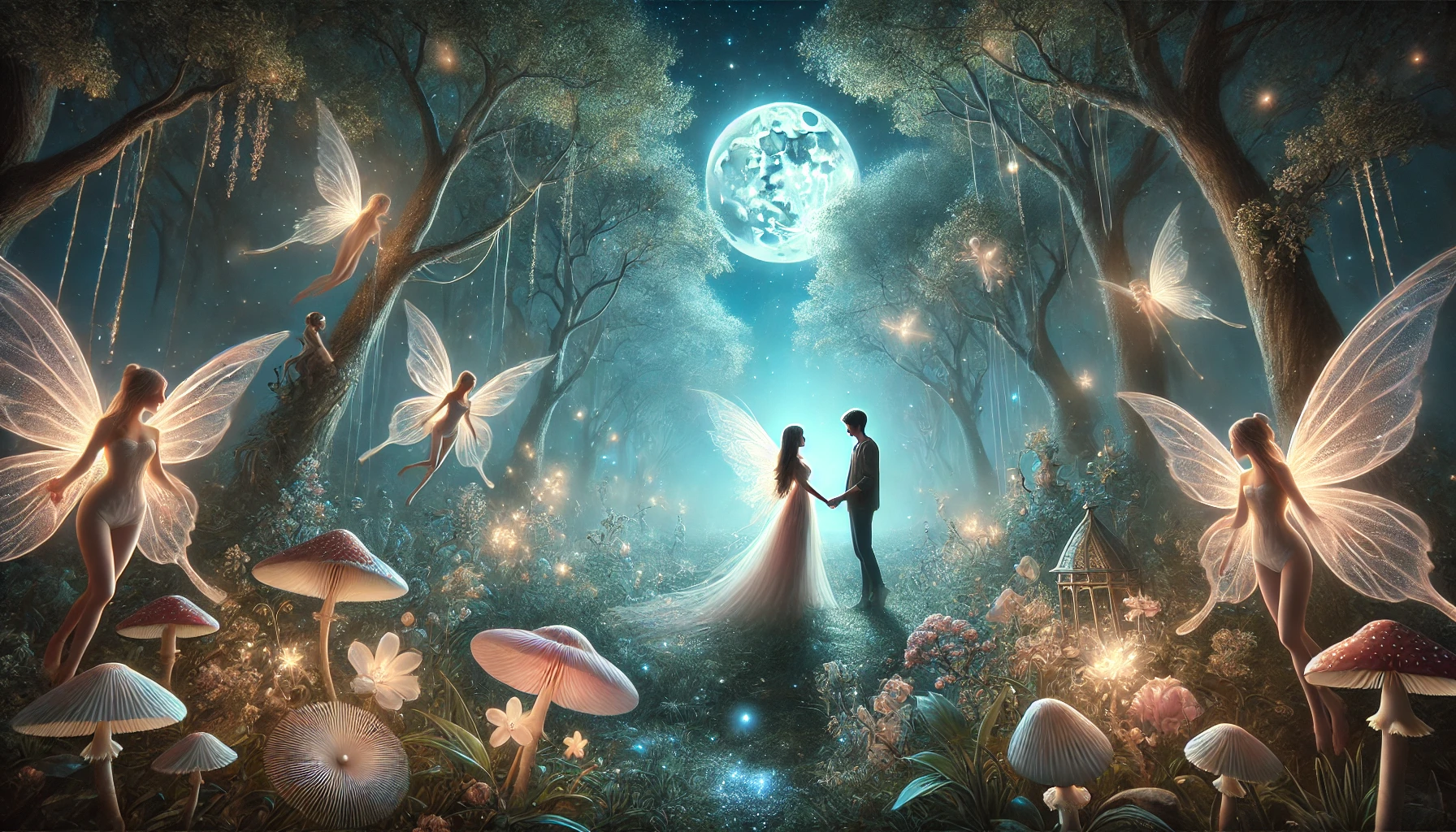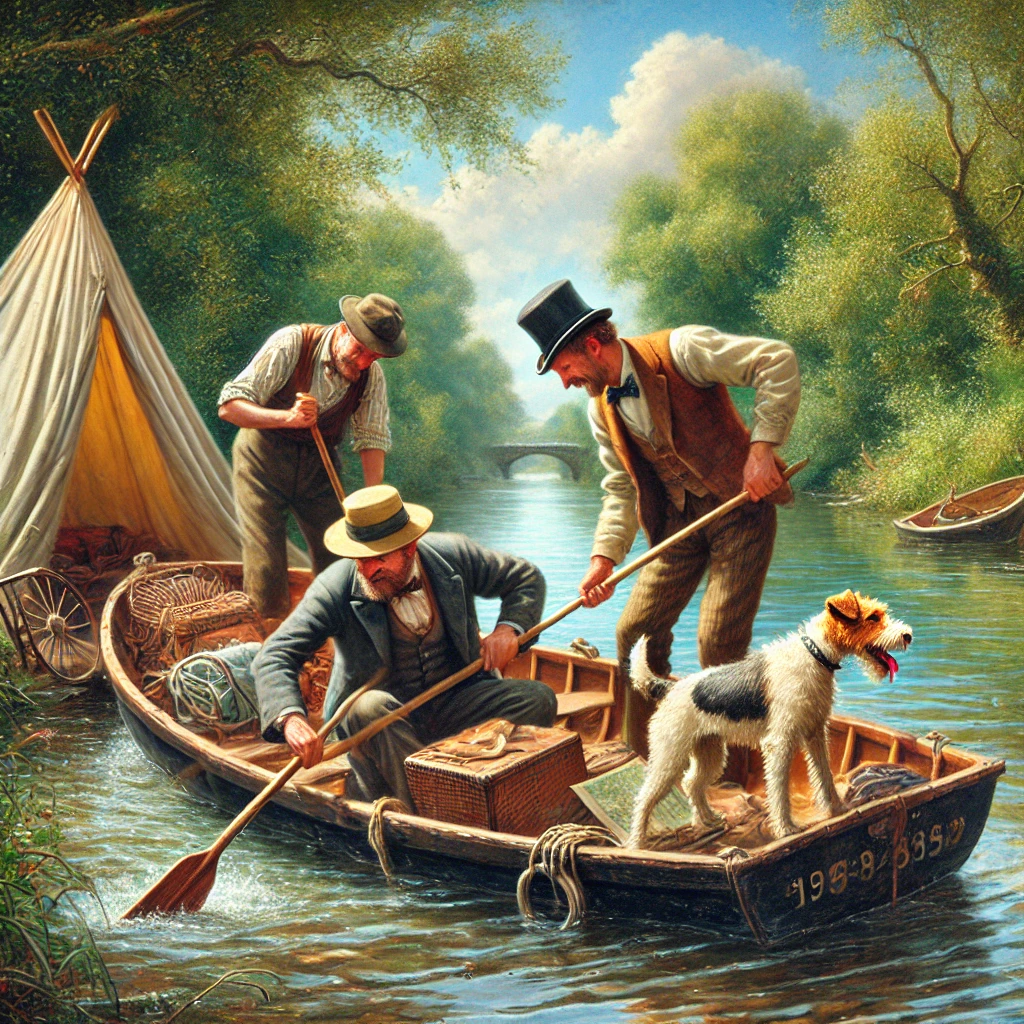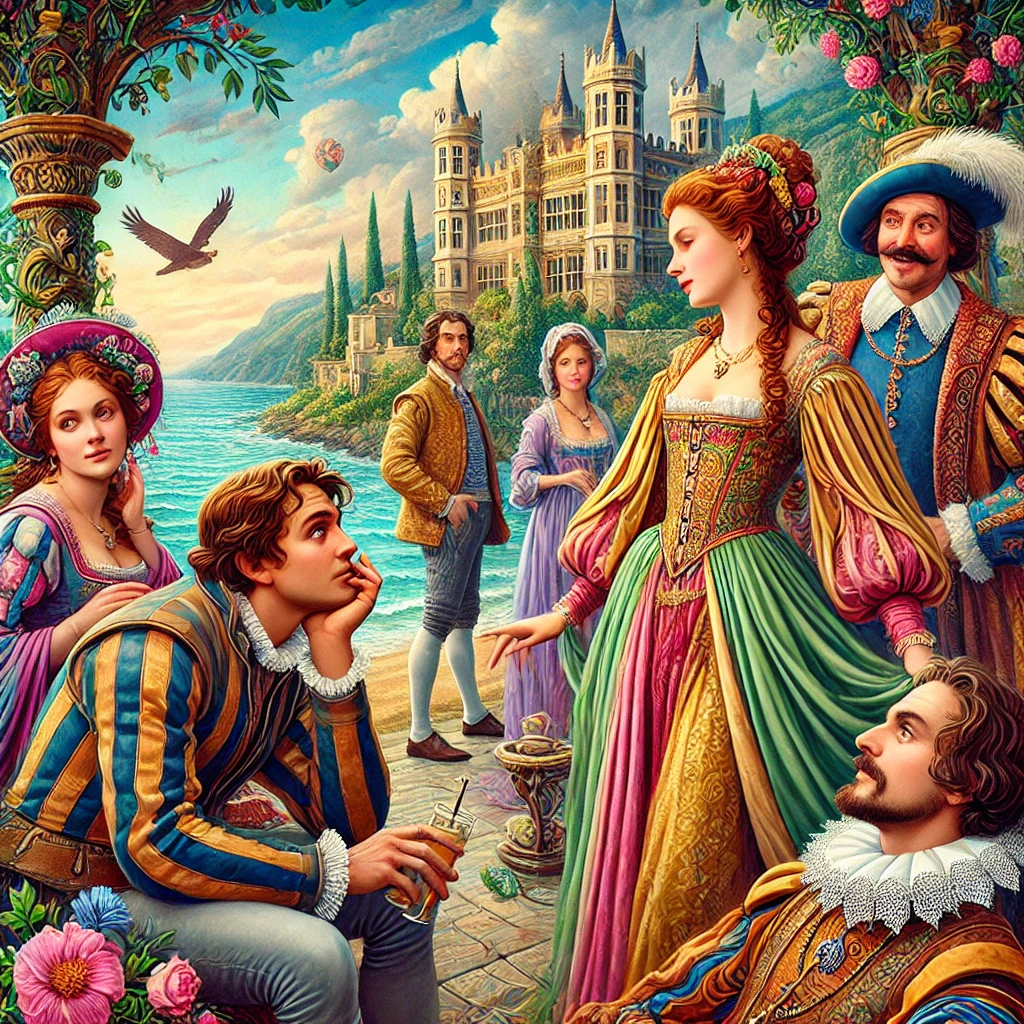Romeo and Juliet, written by William Shakespeare and first published in 1597, is one of the most famous tragedies in English literature. Set in the Italian city of Verona, the play tells the story of two “star-crossed lovers” from feuding noble families, the Montagues and the Capulets. Their ill-fated love, marred by miscommunication, family enmity, and tragic misunderstandings, ultimately leads to their untimely deaths. The play explores the intensity of youthful passion, the destructiveness of familial conflict, and the complexities of love and fate. It has become an enduring symbol of romantic tragedy, deeply ingrained in both literary history and popular culture.
Plot Summary
In the city of Verona, two powerful families, the Montagues and the Capulets, have been locked in a bitter feud for generations. Their hatred runs so deep that even their servants engage in public brawls, filling the streets with violence. It is during such a brawl, as swords clash and tempers flare, that Prince Escalus of Verona arrives, commanding the peace and warning that further bloodshed will be punishable by death.
Amidst this enmity, young Romeo Montague is drowning in sorrow, but not for his family’s ancient grudge. His heart is consumed by unrequited love for Rosaline, a woman who has sworn to live chaste. Seeking distraction, Romeo’s friends, Mercutio and Benvolio, persuade him to attend a grand feast hosted by the Capulets, his family’s sworn enemies. They go in disguise, hoping to enjoy the revelry unnoticed.
As fate would have it, it is not Rosaline who captures Romeo’s eye at the Capulet ball but Juliet, the daughter of Lord Capulet himself. Their eyes meet across the room, and in that instant, they are ensnared by a powerful love. Oblivious to their families’ bitter conflict, they speak, and their attraction blossoms into a shared passion. However, their joy is short-lived, as they soon discover the perilous truth—Romeo is a Montague, and Juliet is a Capulet.
Despite the danger, Romeo cannot resist the pull of love. That same night, he slips into the Capulet orchard, drawn to Juliet’s window. There, beneath the light of the moon, they confess their love, vowing to defy their families and be together. Juliet, radiant and resolute, asks Romeo to prove his love through action—if his intentions are true, they must marry in secret. Eager to seal their bond, Romeo seeks out Friar Laurence, a well-meaning priest who agrees to marry them, hoping the union might reconcile the warring families.
The next day, in the seclusion of the Friar’s cell, Romeo and Juliet are wed. But even as they are bound in love, the shadow of their families’ hatred looms larger. Tybalt, Juliet’s fiery cousin, has recognized Romeo’s presence at the feast and burns with a desire for revenge. He seeks out Romeo in the streets of Verona, challenging him to a duel. Romeo, now married to Juliet, refuses to fight, trying to calm the situation. Mercutio, always quick with his sword and his wit, takes Romeo’s place, mocking Tybalt and drawing his blade. The duel spirals out of control, and Mercutio is fatally wounded. With his dying breath, he curses both the Montagues and Capulets, laying the blame for his death at the feet of their senseless feud.
Enraged by the loss of his dear friend, Romeo abandons his peaceful resolve. He turns on Tybalt, and in a fit of grief and anger, slays him. As Tybalt’s blood stains the streets, Romeo realizes the gravity of his actions. His love for Juliet now lies entangled in the web of violence he sought to avoid. When the Prince learns of the deaths, he shows no mercy. Romeo is banished from Verona, his punishment for Tybalt’s murder.
Desperate, Romeo seeks refuge with Friar Laurence, devastated by the thought of being separated from Juliet. The Friar, ever hopeful, devises a plan. Romeo will flee to Mantua, where he will wait in hiding until the time is right to reveal their marriage. Juliet, meanwhile, is left behind, her heart torn between loyalty to her family and her love for Romeo.
As Romeo departs in secret, Lord Capulet, unaware of his daughter’s marriage, arranges for Juliet to marry Count Paris, a suitor of noble standing. Juliet is horrified. With no other recourse, she rushes to Friar Laurence for help. The Friar, ever resourceful, offers her a dangerous solution—a sleeping potion that will make her appear dead for forty-two hours. Once she is laid to rest in the Capulet tomb, the Friar will send word to Romeo, who will return to rescue her, and together they will escape to a new life.
With a heavy heart, Juliet agrees to the plan. On the eve of her wedding to Paris, she takes the potion and falls into a death-like sleep. The next morning, her family, believing her to be truly dead, is consumed with grief. They lay her body in the Capulet crypt, mourning the loss of their only daughter.
But fate is cruel. The message meant for Romeo, explaining the Friar’s plan, never reaches him. Instead, Romeo’s servant brings him terrible news: Juliet is dead. Overcome with despair, Romeo returns to Verona, resolved to join Juliet in death. Stopping only to procure poison from an apothecary, Romeo hurries to the Capulet tomb. There, he finds Paris mourning Juliet and, in his grief, kills him in a brief struggle. Finally, standing before Juliet’s still form, Romeo takes the poison, bidding farewell to his love before collapsing by her side.
Moments later, Juliet awakens from her deep sleep, only to find Romeo dead beside her. Grief-stricken, she tries to kiss the remaining poison from his lips but finds it too late. With no other option, Juliet takes Romeo’s dagger and plunges it into her heart, ending her life in the same tomb that now holds her beloved.
When the Friar and the city’s watchmen arrive, they find the tragic scene. The deaths of Romeo and Juliet are too great a burden for the Capulets and Montagues to bear. Confronted with the senseless loss of their children, the two families finally lay down their arms, ending the feud that had claimed so many lives.
As the dawn breaks over Verona, it is clear that the cost of hatred has been too high. In their death, Romeo and Juliet achieve what they could not in life—the reconciliation of their families. Yet their love, once bright with promise, now lies entombed in tragedy, a reminder of how deeply the forces of fate and enmity can shape the course of human lives.
Main Characters
Romeo Montague: The play’s male protagonist, Romeo is a young and impulsive romantic. Initially in love with another woman, Rosaline, he quickly falls for Juliet upon first seeing her. His love is intense and idealistic, driving him to defy his family’s feud with the Capulets. His character evolves from a lovesick youth to a determined, passionate lover who faces dire consequences for his actions.
Juliet Capulet: The female protagonist, Juliet begins as an obedient daughter who grows into a woman with her own desires. She is bold and quick-witted, falling deeply in love with Romeo despite knowing the dangers of their union. Throughout the play, Juliet shows remarkable strength and resolve, ultimately choosing love over life in her final act.
Mercutio: Romeo’s close friend, Mercutio is a witty, fiery, and cynical character. His playful banter contrasts with Romeo’s serious romantic nature, and his dramatic death marks a turning point in the play, escalating the tension between the Montagues and Capulets.
Tybalt Capulet: Juliet’s hot-headed cousin, Tybalt is fiercely loyal to the Capulet family and despises the Montagues. His aggressive nature leads to violence and sets in motion the tragic sequence of events that results in Romeo’s banishment.
Friar Laurence: A well-meaning priest who supports Romeo and Juliet’s secret marriage, believing that their union could bring peace between their families. However, his plans go awry, contributing to the play’s tragic conclusion.
The Nurse: Juliet’s confidante, the Nurse is a bawdy and talkative figure who deeply cares for Juliet. While she initially supports Juliet’s relationship with Romeo, her pragmatism ultimately conflicts with Juliet’s idealistic view of love.
Theme
The Power of Love: The play is centered around the passionate love between Romeo and Juliet, which overpowers their loyalty to their feuding families. Shakespeare explores love’s ability to transcend social boundaries and its consequences when unchecked by rationality or societal norms.
Fate and Destiny: Repeated references to fate and the stars suggest that Romeo and Juliet’s tragic end is predestined. From the Prologue’s mention of “star-cross’d lovers” to the series of misfortunes that follow, the play suggests that individuals are often powerless in the face of destiny.
Youth and Impulsiveness: The impetuosity of young love is a major theme in the play. Both Romeo and Juliet act rashly, rushing into marriage and making hasty decisions that lead to their downfall. This theme highlights the intensity and recklessness of youthful passion.
Conflict and Feuding: The longstanding feud between the Montagues and Capulets underpins the entire plot. The senseless violence and animosity between the two families not only affects the lovers but also leads to the deaths of several other characters. The theme examines the destructive power of inherited hatred.
Death and Violence: Death pervades Romeo and Juliet, from the street brawls to the tragic ending. The violent feud creates a backdrop where love and death are intricately linked, and the inevitability of death is presented as a force that tempers the lovers’ passion.
Writing Style and Tone
Shakespeare’s writing style in Romeo and Juliet is characterized by its rich poetic language, particularly the use of iambic pentameter and blank verse. The dialogue often shifts between prose and verse, with characters like Mercutio and the Nurse speaking in more colloquial prose, while Romeo and Juliet express their love in elevated, lyrical poetry. One of the key features of the play’s language is the extensive use of metaphor and simile, especially when Romeo and Juliet speak about love. Their speeches are filled with imagery of light and dark, drawing contrasts between the brightness of their love and the darkness of their circumstances.
The tone of the play moves from romantic and comedic in the early acts to tragic and somber in the latter part. The humor, wit, and youthful exuberance seen in the first half—particularly in the interactions between characters like Mercutio and Romeo—give way to increasing tension and sorrow as the consequences of the lovers’ actions unfold. The shift in tone reflects the overall structure of the play, where joy turns to despair and life gives way to death. Shakespeare masterfully balances these tonal shifts, drawing the audience into the emotional highs and lows of the story.
We hope this summary has sparked your interest and would appreciate you following Celsius 233 on social media:
There’s a treasure trove of other fascinating book summaries waiting for you. Check out our collection of stories that inspire, thrill, and provoke thought, just like this one by checking out the Book Shelf or the Library
Remember, while our summaries capture the essence, they can never replace the full experience of reading the book. If this summary intrigued you, consider diving into the complete story – buy the book and immerse yourself in the author’s original work.
If you want to request a book summary, click here.
When Saurabh is not working/watching football/reading books/traveling, you can reach him via Twitter/X, LinkedIn, or Threads
Restart reading!








